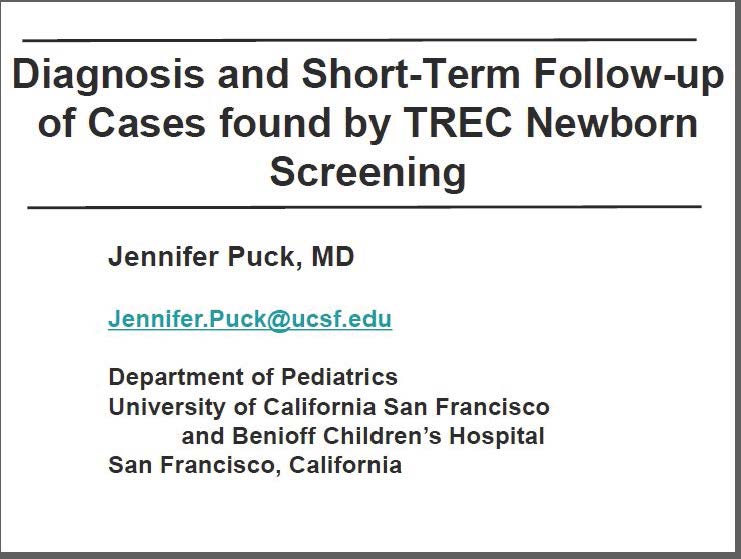

Research supported by NIAID and other organizations has shown that early diagnosis of SCID through newborn screening leads to prompt treatment and high survival rates. To confirm a SCID diagnosis, a doctor will evaluate the numbers and types of T and B cells present and their ability to function. Because infants with SCID have few or no T cells, the absence of TRECs may indicate SCID. The SCID newborn screening test, originally developed at NIH, measures T cell receptor excision circles (TRECs), a byproduct of T-cell development. Candida (yeast) infections of the mouth and diaper area and pneumonia caused by the fungus Pneumocystis jirovecii also are common. Symptoms of SCID occur in infancy and include serious or life-threatening infections, especially viral infections, which may result in pneumonia and chronic diarrhea. As a consequence, they have low numbers of T cells and natural killer cells, and their B cells do not function. Boys with this type of SCID have white blood cells that grow and develop abnormally. X-linked SCID, which is caused by mutations in a gene on the X chromosome, primarily affects male infants.

The best-known form of autosomal recessive SCID is caused by adenosine deaminase (ADA) deficiency, in which infants lack the ADA enzyme necessary for T-cell survival. Most often, SCID is inherited in an autosomal recessive pattern, in which both copies of a particular gene-one inherited from the mother and one from the father-contain defects. More than a dozen genes have been implicated in SCID, but gene defects are unknown in approximately 15 percent of newborn-screened SCID infants, according to an NIH-funded study. However, development of a newborn screening test has made it possible to detect SCID before symptoms appear, helping ensure that affected infants receive life-saving treatments. More than 80 percent of SCID infants do not have a family history of the condition. The condition is fatal, usually within the first year or two of life, unless infants receive immune-restoring treatments, such as transplants of blood-forming stem cells, gene therapy, or enzyme therapy. Infants with SCID appear healthy at birth but are highly susceptible to severe infections. Severe combined immunodeficiency (SCID) is a group of rare disorders caused by mutations in different genes involved in the development and function of infection-fighting immune cells.


 0 kommentar(er)
0 kommentar(er)
